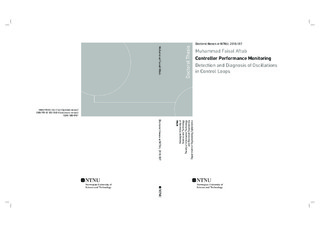Controller Performance Monitoring: Detection and Diagnosis of Oscillations in Control Loops
Doctoral thesis
Permanent lenke
http://hdl.handle.net/11250/2563654Utgivelsesdato
2018Metadata
Vis full innførselSamlinger
Sammendrag
The profitability of any industrial process is closely related to its ability to maintain near optimal operating conditions; therefore robust methods for root cause detection of any control performance degradation is crucial not only to maintain the desired operation of any industrial process but can result in marked improvement in productivity and over all economics.
In a large and complex industrial control system, disturbances/oscillations originating at one point tend to propagate both up- and downstream due to underlying interactions, process flows and recycle streams, thus leading to plant-wide effects. Effective controller performance monitoring therefore requires detection and diagnosis of such plant-wide disturbances so that targeted maintenance can be achieved within the shortest possible time.
Oscillations are considered to be the most important indicator of control performance degradation. Oscillations not only cause product variability and effect quality but also lead to adverse economical consequences owing to loss of precious resources like raw material and energy. Therefore, automated detection and diagnosis of oscillations needs to be reliable and effective as the large scale of the control system in industrial process plants makes manual observation and diagnosis practically impossible.
Detection and diagnosis of oscillatory control loops is not trivial due to the causes such as presence of multiple oscillations, unknown process dynamics, non stationary effects and noise corruption, to name a few. The work presented in this thesis is aimed at addressing these challenges and at the development of improved tools for both detection and diagnosis of oscillations and plant-wide disturbances. Moreover, data driven methods are preferred over model based diagnostics as they are more general and are independent of a specific plant model. Dynamic pro cess models can be costly to develop and maintain, and for many process plants dynamic models are not available.
This thesis has focussed on using the multivariate empirical mode decomposition (MEMD) and associated characteristics for the detection and diagnosis of oscillations in control loops. The methods proposed in thesis are aimed at addressing the shortcomings of the existing approaches and are fully data driven that require no a priori knowledge about the data or process itself. An improved approach for the oscillation detection has been presented that caters for non-stationary effects and reduces the mode mixing problems associated with the univariate empirical mode decomposition. Moreover, MEMD along with the proposed grouping algorithm provides a robust method to detect the plant-wide oscillations where different control variables, having common signatures of oscillations, are oscillating due to the same root cause. This helps in searching for the root cause only in the affected variables.
Another important contribution of the thesis is an automated detection of harmonics in an oscillating signal. Non-linearity induced oscillations give rise to limit cycles characterised by harmonics. The proposed harmonic detection algorithm is the only algorithm to date which fully automates the harmonics detection. Moreover, an index called degree of non-linearity (DNL) based on intra-wave frequency modulation has been used to quantify the extent of non-linearity to isolate the source of non-linearity induced oscillation. Moreover, the MEMD has been combined with the concept of delayed vector variance (DVV) to differentiate between linear and non-linear causes of oscillations. This has extended the applicability of DVV to the non-stationary signals as well. The delay vector variance method is also integrated with automatic calculation of embedding dimension to make it more robust and easy to automate.
Finally, plant-wide disturbances tend to propagate away from source owing to process flows and interactions among the control loops. Therefore, the cause and effect relationship can be exploited to isolate the source of disturbance. The causality analysis based on convergent cross mapping (CCM) approach is also explored for isolating the source of plant-wide oscillations. The CCM works well for the short span time series.
The research has been funded by the Siemens AS, Norway as a part of the Siemens-NTNU oil and gas offshore project.
Består av
Paper A: Aftab, Muhammad Faisal; Hovd, Morten; Sivalingam, Selvanathan. Improved Oscillation Detection via Noise-Assisted Data Analysis © 2018 This manuscript version is made available under the CC-BY-NC-ND 4.0 license http://creativecommons.org/licenses/by-nc-nd/4.0/Paper B: Aftab, Muhammad Faisal; Hovd, Morten; Sivalingam, Selvanathan. Plantwide Oscillation Detection using Multivariate Empirical Mode Decomposition - © 2018. This manuscript version is made available under the CC-BY-NC-ND 4.0 license http://creativecommons.org/licenses/by-nc-nd/4.0/ The final version is available in Computers & Chemical Engineering Volume 117, 2 September 2018, Pages 320-330 https://doi.org/10.1016/j.compchemeng.2018.06.007
Paper C: Aftab, Muhammad Faisal; Hovd, Morten; Sivalingam, Selvanathan. Detecting non-linearity induced oscillations via the dyadic filter bank property of multivariate empirical mode decomposition. Journal of Process Control 2017 ;Volum 60. s. 68-81 https://doi.org/10.1016/j.jprocont.2017.08.005
Paper D: Diagnosis of Plant-Wide Oscillations by Combining Multivariate Empirical Mode Decomposition and Delay Vector Variance
Paper E: Aftab, Muhammad Faisal; Hovd, Morten; Sivalingam, Selvanathan. Convergent cross mapping (CCM) based approach for isolating the source of plant-wide disturbances. Control Technology and Applications (CCTA) https://doi.org/10.1109/CCTA.2017.8062669 © 2017 IEEE. Personal use of this material is permitted. Permission from IEEE must be obtained for all other uses, in any current or future media, including reprinting/republishing this material for advertising or promotional purposes, creating new collective works, for resale or redistribution to servers or lists, or reuse of any copyrighted component of this work in other works
Paper F: Aftab, Muhammad Faisal; Hovd, Morten; Huang, Norden E; Sivalingam, Selvanathan. An Adaptive Non-Linearity Detection Algorithm for Process Control Loops. IFAC-PapersOnLine 2016 ;Volum 49.(7) s. 1020-1025 https://doi.org/10.1016/j.ifacol.2016.07.336
Paper G: Aftab, Muhammad Faisal; Hovd, Morten; Sivalingam, Selvanathan. A Delay Vector Variance based Approach for Detecting and Isolating the Non-linearity Induced Oscillations in Control Loops. IFAC-PapersOnLine 2017 ;Volum 50.(1) s. 7975-7980 https://doi.org/10.1016/j.ifacol.2017.08.992
